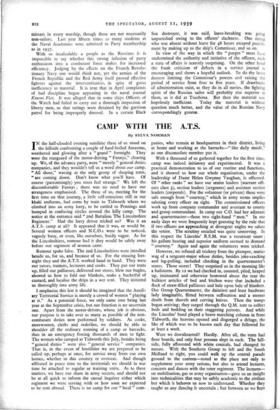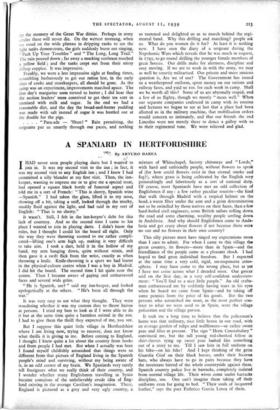CAMP WITH THE A.T.S.
By SYLVA NORMAN
IN the half-clouded evening sunshine three of us stood on the hillside confronting a couple of hard-boiled Amazons, weathered and glowing after a " grand " fortnight. They were the rearguard of the motor-driving " Fannys," clearing up. We, of the advance party, were " merely " general duties companies, and they wouldn't tell us a word about our camp. "All those," waving at the only group of sleeping tents, "are coming down. Don't know what you'll have. Of course (patronisingly) you must feel strange." We left the discomfortable Fannys ; there was no need to have our strangeness emphasised. The three of us, meeting for the first time on that journey, a little self-conscious still in our khaki uniforms, had come by train to Tidworth where we climbed into an army lorry, to be rattled to Pennings and bumped in confusing circles around the hilly camp. The notice at the entrance said "2nd Battalion The Lincolnshire Regiment." Had the lorry driver tricked us? Was it an A.T.S. camp at all? It appeared that it was, or would be. Several women officers and N.C.O.s were to be noticed, vaguely busy, or even, like ourselves, busily vague. As for the Lincolnshires, rumour had it they would be safely away before our regiment of women came.
Rumour spoke false. The 2nd Lincolnshires were installed beside us, for us, and because of us. For the ensuing fort- night they and the A.T.S. worked hand in hand. They were our tutors, trainers, lecturers and cooks. They put our tents up, filled our palliasses, delivered our stores, blew our bugles, showed us how to fold our blankets, make a bucketful of custard, and localise the drips in a wet tent. They initiated us thoroughly into army life.
I emphasise this lest it should be imagined that the Auxili- ary Territorial Service is merely a crowd of women "playing at it." As a potential force, we only came into being last year at the September crisis, but our function is no uncertain one. Apart from the motor-drivers, whose job is obvious, our purpose is to take over as many as possible of the non- combatant duties now performed by soldiers. As cooks, storewomen, clerks and orderlies, we should be able to shoulder all the ordinary running of a camp or barracks, thus in an emergency freeing thousands of men to fight. The women who camped at Tidworth this July, besides being "general duties" were also "general service" companies. That is, in the event of hostilities we are prepared to be called up, perhaps at once, for service away from our own homes, whether in this country or overseas. And though affiliated in peace time to the territorials we should in war time be attached to regular or training units. As to these matters, we have our share in army secrets, and should not be at all quick to inform the casual inquirer either which regiment we were serving with or how soon we expected to be sent abroad. There is no camp for our " local " corn- panies, who remain at headquarters in their district, living at home and working at the barracks—" like daily maids," as one disconsolate member put it.
With a thousand of us gathered together for the first time, camp was indeed initiatory and experimental. It was a practical demonstration to us of our routine and functions, and it showed us how our whole organisation, under the leadership of Dame Helen Gwynne Vaughan, is officered. Of "other ranks" we have our senior leaders (warrant offi- cers class 3), section leaders (sergeants) and, assistant section leaders (corporals). For the volunteer (or private) these were safe enough from "courtesy," which in army terms implies saluting every officer on sight. The commissioned officers work up from company commander and assistant to county and group commandant. In camp our C.O. had her adjutant and quartermaster—those two right-hand "men." In our early days we were frequently kept guessing by the rule that if two officers are approaching at divergent angles we salute the senior. The scrutiny entailed was quite unnerving. In this respect the Lincolns' R.S.M. was a recurrent snare ; his gallant bearing and superior uniform seemed to demand "courtesy." Again and again the volunteers were tricked.
However, we refused all trickery from the plumper, matier wag of a sergeant-major whose duties, besides joke-cracking and leg-pulling, included checking in the quartermaster's stores. Those stores! They surprised us in the morning like a hailstorm. By 12 we had checked in, counted, piled, heaped up, insinuated and otherwise bestowed about the tent the bulkiest articles of bed and kitchen ware that inckided a flock of straw-filled palliasses and bale upon bale of blankets. Our Group Quartermaster, the daintiest and least hardware lady imaginable, flitted between suffocation and a sterner death from shovels and carving knives. Then the troops began arriving; they surged through the Q.M. tent to collect beds and bedding on their staggering persons. And while the Lincolns' band played a brave marching column in from Tidworth, the heavens opened and disgorged a deluge, the like of which was to be known each day that followed for at least a week.
Were we downhearted? Hardly. After all, the tents had floor boards, and only four persons slept in each. The hill- side, fully afforested with white conicals, had changed its nature. With the Southern Group to left and the South Midland to right, you could walk up the central parade ground to the canteen—noted as the place not only to supplement your army rations, but also to attend lectures, concerts and dances with the tutor regiment. The lectures— on mobilisation, gas or army organisation—gave us an insight into technicalities that may be safely academic to the civilian but which it behoves us now to understand. Whether they taught us any dancing is uncertain ; but between us we kept p the memory of the Great War ditties. Perhaps in army rcles these will never die. On the wettest morning, when ‘ve stood on the wide plateau in dripping ranks to see the light tanks demonstrate, the girls suddenly burst out singing, "Pack Up Your Troubles" and "The Long, Long Trail." The rain poured down ; far away a mocking sunbeam touched a yellow field ; and the tanks crept out from their misty hilltop coppice. It was impressive.
Frankly, we were a less impressive sight at feeding times, scrambling barbarously to get our ration lest, in the early days of cooks and storekeepers, all should be gone. As the camp was an experiment, improvements marched apace. The first day's margarine soon turned to butter ; I did hear that the section leaders' mess contrived to get their tea sent in unmixed with milk and sugar. In the end we had a reasonable diet, and the day the bread-and-butter pudding was made with salt instead of sugar it was hustled out at the double for the pigs.
. . . " Para-ade — 'Shun! " Rain permitting, the sergeants put us smartly through our paces, and nothing so tautened and delighted us as to march behind the regi- mental band. Why this drilling and marching? people ask us. What do you women do it for? At least it is nothing new. I have seen the diary of a sergeant during the Napoleonic Wars which reveals that he was much in request, in 1795, to go round drilling the younger female members of great houses. Our drills make for alertness, discipline and easy moving. If we are to work in with the army, we may as well be smartly militarised. Our private and more anxious question is, Are we of use? The Government has issued us a weatherproof uniform, spent money on our rations and railway fares, and paid us tos. for each week in camp. Shall we be worth all this? Some of us are abysmally stupid, and a few of us flighty, though we mostly "mean well." When our separate companies coalesced in camp with its routine and lectures we began to see at last that a place had been allotted us in the military machine, that mobilisation orders would concern us intimately, and that our friends the znd Lincolns were not merely there to dance a gallop with us to their regimental tune. We were relieved and glad.









































 Previous page
Previous page